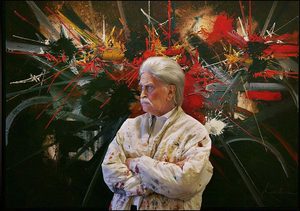Georges Mathieu
Georges Mathieu, born in 1921 in Boulogne-sur-Mer, France, was a pioneering figure in post-war abstract art. Known for his dynamic and expressive style, Mathieu is often credited with founding Lyrical Abstraction, a movement that emphasised spontaneity, emotion, and the gestural application of paint. He studied literature and law at the University of Lille before turning to art in the 1940s, a transition that marked the beginning of an influential and prolific career.
Mathieu's paintings are characterised by their vigorous, sweeping brushstrokes and intense energy. He often worked on large canvases, applying paint rapidly and directly from the tube or with unconventional tools, such as his fingers and large brushes. This technique created a sense of immediacy and movement, capturing the physical act of painting itself. His style was influenced by American Abstract Expressionism and Japanese calligraphy, blending Western and Eastern artistic traditions into a unique visual language.
Throughout the 1950s and 1960s, Mathieu's work gained international acclaim. He was a central figure in numerous exhibitions, including the 1952 Venice Biennale and the 1956 São Paulo Biennial, where his work was celebrated for its innovation and emotive power. One of his most notable performances was at the Sarah Bernhardt Theatre in Paris in 1956, where he completed a large-scale painting in front of a live audience, underscoring the performative aspect of his art.
In addition to his painting, Mathieu was an influential art theorist and critic. He wrote extensively on the philosophy of art and the role of the artist, arguing for the importance of emotion and intuition over rationality and technique. His writings and lectures helped to shape contemporary understandings of abstract art and its potential to convey profound human experiences.
Mathieu's work is included in major public and private collections worldwide, such as the Museum of Modern Art in New York, the Centre Pompidou in Paris, and the Tate in London. His contributions to the art world were recognised with numerous awards and honours, including the French Legion of Honour.
Despite his success, Mathieu remained a controversial figure. His outspoken views on art and his theatrical approach to painting often polarised critics and audiences. However, his impact on the development of post-war abstract art is undeniable. He paved the way for future generations of artists to explore new forms of expression and to embrace the emotional and performative aspects of their practice.
Georges Mathieu's legacy is marked by his relentless pursuit of innovation and his commitment to the emotive power of art. His work continues to inspire and challenge, inviting viewers to engage with the raw energy and spontaneity that define his paintings. Mathieu passed away in 2012, leaving behind a body of work that remains a testament to his vision and influence in the world of contemporary art.
Featured Artists
- Albers Anni
- Ancart Harold
- Andre Carl
- Avery Milton
- Baldessari John
- Barnes Ernie
- Castellani Enrico
- Clough Prunella
- Crawford Brett
- Dadamaino
- de Tollenaere Saskia
- Dyson Julian
- Elsner Slawomir
- Freud Lucian
- Gadsby Eric
- Gander Ryan
- Guston Philip
- Hartung Hans
- Hayes David
- Held Al
- Hepworth Barbara
- Hill Anthony
- Hitchens Ivon
- Hockney David
- Hutchinson Norman Douglas
- Jenney Neil
- Katz Alex
- Kentridge William
- Knifer Julije
- Kusama Yayoi
- Le Parc Julio
- Leciejewski Edgar
- Léger Fernand
- Levine Chris
- Marchéllo
- Martin Kenneth
- Mavignier Almir da Silva
- Miller Harland
- Mitchell Joan
- Modé João
- Moore Henry
- Morellet François
- Nadelman Elie
- Nara Yoshitomo
- Nesbitt Lowell Blair
- Nicholson Ben
- O'Donoghue Hughie
- Pasmore Victor
- Perry Grayson
- Picasso Pablo
- Pickstone Sarah
- Prehistoric Objects
- Riley Bridget
- Ruscha Ed
- Sedgley Peter
- Serra Richard
- Shrigley David
- Smith Anj
- Smith Richard
- Soto Jesús Rafael
- Soulages Pierre
- Spencer Stanley
- Taller Popular de Serigrafía
- The Connor Brothers
- Vasarely Victor
- Vaughan Keith
- Whiteread Rachel
- Wood Jonas
